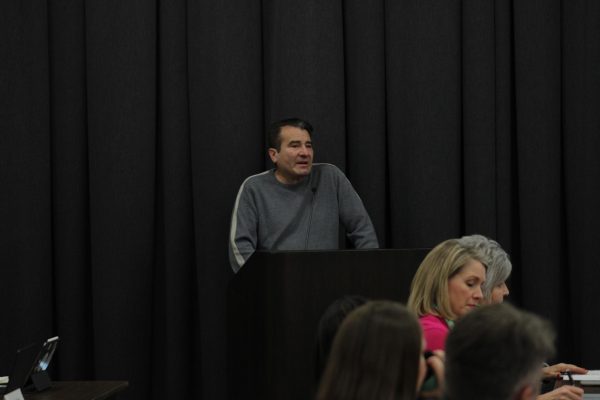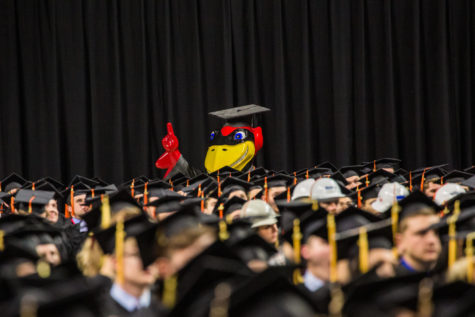Graduate student union to fight for professional working environments
“The environment at Iowa State and academia generally, but in Iowa State especially, is so toxic that I just don’t want to go into academia,” said Audrey McCombs, an Iowa State alumni with a co-major doctorate in ecology and statistics.
Iowa State’s Beardshear Hall was named in honor of William Beardshear, the president of Iowa State from 1892 to 1902.
A group of graduate students at Iowa State, Graduate Student Voices, is leading a unionizing effort to improve working conditions and benefits, ultimately working toward a more equitable environment.
Audrey McCombs is an Iowa State alumna who graduated in spring 2022 with a co-major doctorate in ecology and statistics. McCombs is far from a traditional student, having just finished her second bout of graduate school after 10 years in natural resources management.
McCombs said her personal motivation for unionizing is the toxic culture toward graduate students at Iowa State. Audrey said the graduate student experience is fraught with power differentials and abuses of power.
“I had a sense of maturity and professional agency before I came to Iowa State, and so I had an understanding of what is appropriate professional behavior and what being treated as a collaborator and a valuable member of the workforce looks like,” McCombs said. “And that was absolutely not what I found at Iowa State.”
McCombs applied for and received an offer for a NSF Postdoctoral Fellowship, but she said she turned it down because of the environment at Iowa State.
“The environment at Iowa State and academia generally, but in Iowa State especially, is so toxic that I just don’t want to go into academia,” McCombs said.
Angie Hunt, communication specialist at Iowa State, offered a comment on behalf of the university in an email response.
“We value all graduate students at Iowa State, and we recognize the important contributions of graduate students who are appointed to teaching and research assistantships,” Hunt said. “University leaders and the Graduate College partner with the faculty-led Graduate Council and the Graduate and Professional Student Senate to understand and respond to graduate student concerns, and to enhance the graduate student and assistant experience on our campus. We work to ensure that graduate education at Iowa State, including the support provided to graduate assistants, aligns with best practices at universities across the country.”
McCombs explained an incident of a professor using physical and bureaucratic deficits of power, as well as screaming, to intimidate and bully her over suggestions and differing ideas of how classes should be taught.
“It was an obvious case of bullying, and he was a senior professor in the department with way more power, obviously, than I had as a graduate student,” McCombs said.
McCombs said her various attempts to deal with issues like these through the university often ended in administrative members siding with faculty and disregarding her complaints as a graduate student.
“I think unionizing will help provide an outside mechanism for holding professors accountable and the university can’t because of the tenure system,” McCombs said. “But, if graduate students are organized, and there’s this sort of outside organization that will advocate for graduate students, then I think that will help.”
McCombs said the toxic culture of academia is no secret and is not limited to Iowa State. On top of the lack of professionalism between professors and graduate students, McCombs said the classification of graduate students as students rather than employees prevents them from receiving benefits they should be entitled to.
“The fact that they’re not designating us employees is hugely problematic,” McCombs said. “I mean, it strips us of a lot of legal rights that we would otherwise have as employees.”
McCombs said graduate students even fall into the state’s categorization for public employees. Regardless, Iowa State does not acknowledge graduate students as employees or offer benefits consistent with expectations for employees.
“We don’t have what we need in order to make it as human beings,” McCombs said. “A union is not going to fix everything, but it’s a first step; things aren’t gonna get better until we organize and have the kind of power that we need in order to make some changes.”
Annabelle Lolinco, a doctoral candidate in chemistry, said she experienced few incidents of bullying or harassment during her graduate student experience. Still, Lolinco said a graduate student union would help to represent graduate students not only as students trying to get an education, but also a significant portion of the labor force at Iowa State.
“We’re the backbone of the university as far as teaching goes and research and presenting our work,” Lolinco said. “And there are just some processes that aren’t formalized that could be better served with union representation.”
Without an employee status, grad students are unable to apply for workman’s compensation and other benefits. For context, graduate students at the University of Iowa are considered employees and have been unionized since 1996.
“We still are qualified under student health care, and we’re just in a different place than undergraduates are,” Lolinco said. “And meaning to address that where we might have more family care or, you know, other considerations, that’s just really important for us.”
Lolinco said having a union could also bring a standardized grievance process outside the power dynamics that exist between advisers and graduate students.
The case against unionizing
Levi Soborowicz and Ezra Butcher, who are both doctoral students in the economics department, drafted a letter for publication in the Iowa State Daily, to point out that unionizing may not be an ideal move for improving working conditions for graduate students.
“We kind of addressed that in the article we’re working on, but basically, if you impose a cost and you have pretty much captive supply of students, then demand is going to go down in the future, which means you’re going to have fewer slots,” Butcher said. “You’re gonna have a lower equilibrium wage that has to be compensated for in some manner in the long term.”
Soborowicz said while the stipends graduate students receive have not kept up with increases in the cost of living, unionizing would not bring about the effects that graduate students intend.
“The problem is they’re essentially an agent for all the grad students currently at the university. But, if the university wants to stay healthy, it has to get future graduate students,” Soborowicz said. “We’ll get more money as graduate students, but the university is going to lose the graduate student population that it has access to. You can’t raise the cost of an input and then simultaneously keep the quantity supplied the same.”
Regardless of how a union affects the financial state of the university, Graduate Student Voices proposes that a union would also serve to give fair treatment to graduate students. Butcher said by creating an interdepartmental standard of how things work, experts within each department will lose their say on how to handle different issues.
“So the people in that department, both the students and the faculty staff, have better information about the mechanics necessary for that department to operate to produce its research goals, to hit its teaching goals within a certain budget,” Butcher said. “But, a union is just going to come in and disrupt that with likely imperfect information, right bureaucratically kind of top down.”
Butcher said within each department, state and federal labor laws already apply, meaning misconduct can and should be dealt with in the department.
Soborowicz and Butcher are not unsympathetic to financial and social issues experienced by other graduate students. Butcher said the fact that graduate student stipends have not matched increases in the cost of living and that graduate students are not considered employees are valid complaints, but they should be handled within the university.
“The problem is, if there’s a union, they say ‘students have to be employees and you have to give them all of these benefits.’ Well, that money actually comes from somewhere,” Butcher said. “We’re talking about disrupting an equilibrium and damaging the university, the undergraduate experience, everything else and also depriving spots to new grads.”
Your donation will support the student journalists of the Iowa State Daily. Your contribution will allow us to purchase equipment, send our student journalists to conferences and off-set their cost of living so they can continue to do best-in-the-nation work at the Iowa State Daily.











